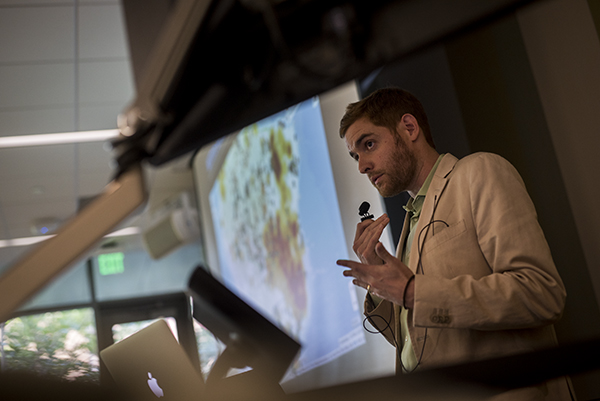The eradication of the Amazon will significantly change the movement of energy and oxygen around the Earth and shift climates globally, a UT professor said at a panel Thursday.
Four environmental experts discussed the recent fires throughout the Amazon rainforest during an panel hosted by the UT College of Liberal Arts in Patton Hall on Thursday. The Brazilian state of Amazonas declared a state of emergency in late August due to a rising number of fires in the region, according to BBC News.
Eugenio Arima, geography and environmental associate professor, said he is uneasy about the future implications of the fires.
“Needless to say, the scientific community is very concerned,” Arima said. “The Amazon is a pump that puts oxygen into the atmosphere, and considering 40% of rainfall in the Amazon is recycled from the forest, if this trend continues … the Amazon will become a savanna.”
The panelists included Arima, Edward Shore, research fellow at Texas Law, Cynthia Simmons, University of Florida geography professor, and Chris Searles, the founder and director of Austin-based environmental nonprofit BioIntegrity.
Simmons said changing governmental actions in recent years, such as the freezing of Amazon funds dedicated to environmental policy enforcement and a reduction in offender fines, have contributed to the fires. Searles said policymakers and scholars must confront how these fires impact indigenous peoples, who are primarily being affected because they live near the area.
“We can’t understand these fires without acknowledging previous governmental legislation,” Searles said.
Arima said people have expressed concern about a depletion of breathable oxygen in the Amazon, but he said this is not a scientifically valid concern. Arima said the world will not run out of air to breathe, but rather the eradication will lead to perceivable changes in U.S. temperatures and precipitation patterns.
“I want to understand how this happened,” biochemistry junior Katelyn Kennedy said. “To what extent was this human-inflicted? And is it possible to fix this?”
Simmons, who recently completed field work in the Eastern Amazon, said the eventual suppression of the fires won’t necessarily be the end of the world’s environmental problems.
“It’s unlikely that any conservation efforts can be implemented in time, and worse fires are yet to come,” Simmons said. “Unless we really change what we care about, … we don’t have much of a chance.”





















